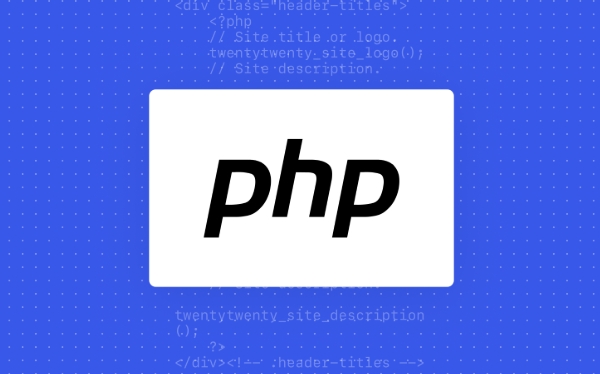 Backend Development
Backend Development
 PHP Tutorial
PHP Tutorial
 Dynamic Constant Resolution with `defined()` and the `constant()` Function
Dynamic Constant Resolution with `defined()` and the `constant()` Function
Dynamic Constant Resolution with `defined()` and the `constant()` Function
Jul 31, 2025 am 11:34 AMDynamic constant parsing can be implemented through defined() and constant() functions. First, use defined() to check whether the constant exists, and then use constant() to obtain its value to avoid undefined errors. 1. defined('CONST_NAME') returns a boolean value, used to determine whether the constant has been defined, and a constant name string must be passed in. 2. constant('CONST_NAME') returns the value of the corresponding constant and supports dynamic splicing names. 3. Practical applications include: multi-environment configuration management, automatically loading the corresponding configuration through environment variable splicing constant names; dynamic reading of module constants in the plug-in system; and combining encapsulation functions to achieve default value fallback. 4. Note: Constant names are case sensitive by default; constant() triggers E_WARNING when the constant is not defined, so it must be checked with defined() first; it is not applicable to const definition in the class, and class constants need to be accessed through ReflectionClass or scope operators. Summary: The core mode of dynamic constant analysis is to judge first and then read, which is suitable for configuration switching, modular design and flexible configuration abstraction layer construction, and to fully realize safe and efficient dynamic access of constants.

In PHP, dynamic constant resolution is a relatively useless but very practical feature, especially when dealing with configuration, multi-environment constants, or plug-in systems. With defined() and constant() functions, we can safely check whether a constant exists and get its value dynamically at runtime, thus avoiding triggering errors due to accessing undefined constants.

The following is a detailed introduction to how these two functions work together to implement dynamic constant resolution (Dynamic Constant Resolution) .
1. defined() : Check whether the constant exists
defined(string $constant_name): bool is used to determine whether a constant has been defined.

if (defined('APP_ENV')) {
echo 'Environment has been set:' . APP_ENV;
} else {
echo 'Environment is not defined';
}You can also use it to check the dynamically generated constant names:
$prefix = 'CONFIG';
$name = $prefix . '_TIMEOUT';
if (defined($name)) {
echo constant($name);
} else {
echo "Constant $name undefined";
}?? Note:
defined()receives string form of constant name , rather than writing constants directly (such asdefined(CONFIG_TIMEOUT)is wrong, it should bedefined('CONFIG_TIMEOUT')).
2. constant() : dynamically obtain constant values
constant(string $constant_name): mixed allows you to get the value of a constant by string name, which is very suitable for dynamic scenarios.
define('SITE_NAME', 'MyWebsite'); define('SITE_DEBUG', true); $setting = 'SITE_NAME'; echo constant($setting); // Output: MyWebsite
Combined with variable splicing, more flexible configuration reading can be achieved:
$section = 'DATABASE';
$key = 'HOST';
$constName = "{$section}_{$key}"; // DATABASE_HOST
if (defined($constName)) {
$value = constant($constName);
echo "Database Host: $value";
} else {
echo "Configuration not found: $constName";
}3. Practical application scenarios
? Configuration Management (Multiple Environment)
For example, development, testing, and production environments use different constants:
$env = $_ENV['APP_ENV'] ?? 'DEV';
$configKeys = ['HOST', 'USER', 'PASS', 'DB'];
$config = [];
foreach ($configKeys as $key) {
$constName = "DB_{$env}_{$key}";
if (defined($constName)) {
$config[strtolower($key)] = constant($constName);
}
}This way, the corresponding constant configuration can be automatically loaded according to the environment.
? Plug-in or modular system
Some plugins may define their own prefix constants, which can be read dynamically by the main program:
$plugin = 'PAYPAL';
if (defined("{$plugin}_VERSION")) {
$version = constant("{$plugin}_VERSION");
echo "Plugin{$plugin} version: $version";
}? Default value fallback
function getConstant(string $name, $default = null) {
return defined($name) ? constant($name) : $default;
}
// Use $timeout = getConstant('REQUEST_TIMEOUT', 30);4. Things to note
- Constant names are case sensitive (unless
define('name', value, true)is set to indistinguishable, but the usage is deprecated). -
constant()will trigger E_WARNING when the constant is undefined, so be sure to usedefined()to judge first . - Not applicable to
constdefinitions in a class (that is a class constant). To access a class constant, you need to useReflectionClassor::class::CONSTsyntax.
Summarize
Use defined() and constant() to safely implement dynamic constant parsing, which is particularly suitable for:
- Multi-environment configuration switching
- Dynamic load module settings
- Build a flexible configuration abstraction layer
The key mode is:
$constName = 'DYNAMIC_NAME';
if (defined($constName)) {
$value = constant($constName);
// Use $value
}Basically all this is not complicated but easy to ignore.
The above is the detailed content of Dynamic Constant Resolution with `defined()` and the `constant()` Function. For more information, please follow other related articles on the PHP Chinese website!

Hot AI Tools

Undress AI Tool
Undress images for free

Undresser.AI Undress
AI-powered app for creating realistic nude photos

AI Clothes Remover
Online AI tool for removing clothes from photos.

Clothoff.io
AI clothes remover

Video Face Swap
Swap faces in any video effortlessly with our completely free AI face swap tool!

Hot Article

Hot Tools

Notepad++7.3.1
Easy-to-use and free code editor

SublimeText3 Chinese version
Chinese version, very easy to use

Zend Studio 13.0.1
Powerful PHP integrated development environment

Dreamweaver CS6
Visual web development tools

SublimeText3 Mac version
God-level code editing software (SublimeText3)

Hot Topics
 Understanding Constant Expression Evaluation in PHP's Engine
Jul 29, 2025 am 05:02 AM
Understanding Constant Expression Evaluation in PHP's Engine
Jul 29, 2025 am 05:02 AM
PHPevaluatesconstantexpressionsatcompiletimetoimproveperformanceandenableearlyerrordetection.1.Constantexpressionevaluationmeanscomputingvaluesduringcompilationwhenalloperandsareknownconstantslikeliterals,classconstants,orpredefinedconstants.2.PHP’se
 The Performance Paradigm: Analyzing the Speed of Constants vs. Variables
Jul 30, 2025 am 05:41 AM
The Performance Paradigm: Analyzing the Speed of Constants vs. Variables
Jul 30, 2025 am 05:41 AM
?Yes,constantsarefasterthanvariablesincompiledlanguagesduetocompile-timeevaluationandinlining.1.Constantsareevaluatedatcompiletime,enablingvalueinlining,constantfolding,andeliminationofmemoryallocation,whilevariablesrequireruntimeresolutionandmemorya
 Namespacing and Constants: Avoiding Collisions in Large-Scale Projects
Jul 30, 2025 am 05:35 AM
Namespacing and Constants: Avoiding Collisions in Large-Scale Projects
Jul 30, 2025 am 05:35 AM
Namespacingpreventsconstantcollisionsinlarge-scalesoftwareprojectsbygroupingrelatedconstantswithinuniquescopes.1)Constants,whichshouldremainunchangedduringruntime,cancausenamingconflictswhendefinedglobally,asdifferentmodulesorlibrariesmayusethesamena
 Unveiling the Behavior of Constants within PHP Traits and Inheritance
Jul 29, 2025 am 03:58 AM
Unveiling the Behavior of Constants within PHP Traits and Inheritance
Jul 29, 2025 am 03:58 AM
PHPdoesnotallowconstantredeclarationbetweentraitsandclasses,resultinginafatalerrorwhenduplicateconstantnamesoccuracrosstraits,parentclasses,orchildclasses;1)constantsintraitsarecopieddirectlyintotheusingclassatcompiletime;2)ifaclassdefinesaconstantwi
 `define()` vs. `const`: A Deep Dive into PHP Constant Declaration
Jul 30, 2025 am 05:02 AM
`define()` vs. `const`: A Deep Dive into PHP Constant Declaration
Jul 30, 2025 am 05:02 AM
Use const first because it parses at compile time, has better performance and supports namespaces; 2. When you need to define constants in conditions and functions or use dynamic names, you must use define(); 3. Only const can be used to define constants in classes; 4. define() can dynamically define expressions and complete namespace strings at runtime; 5. Once both are defined, they cannot be modified, but define() can avoid repeated definitions through defined(), while const cannot be checked; 6. The const name must be literal and does not support variable interpolation. Therefore, const is suitable for fixed and explicit constants, define() is suitable for scenarios that require runtime logic or dynamic naming.
 Architecting with Immutability: Strategic Use of Constants in PHP
Jul 29, 2025 am 04:52 AM
Architecting with Immutability: Strategic Use of Constants in PHP
Jul 29, 2025 am 04:52 AM
ConstantsshouldbeusedtoenforceimmutabilityinPHPforbettercodeclarityandsafety;1)useconstantsforconfigurationanddomainlogiclikestatuscodesorAPIendpointstoavoidmagicvalues;2)preferclassorinterface-scopedconstantsoverglobalonestoimprovenamespacinganddisc
 Demystifying PHP's Magic Constants for Context-Aware Applications
Jul 30, 2025 am 05:42 AM
Demystifying PHP's Magic Constants for Context-Aware Applications
Jul 30, 2025 am 05:42 AM
The seven magic constants of PHP are __LINE__, __FILE__, __DIR__, __FUNCTION__, __CLASS__, __TRAIT__, __METHOD__, and they can dynamically return code location and context information, 1. LINE returns the current line number, for precise debugging; 2. FILE returns the absolute path of the current file, often used to reliably introduce files or define root directory; 3. DIR returns the directory where the current file is located, which is clearer and more efficient than dirname (__FILE__); 4. FUNCTION returns the current function name, suitable for function-level log tracking; 5. CLASS returns the current class name (including namespace), in logs and factories
 Achieving Type Safety with PHP Class Constants and Enumerations
Jul 30, 2025 am 01:23 AM
Achieving Type Safety with PHP Class Constants and Enumerations
Jul 30, 2025 am 01:23 AM
PHP8.1 enumsprovidetruetypesafetyoverclassconstantsbyenablingnativetypehintsandcompile-timevalidation.1.Classconstantslacktypeenforcement,allowinginvalidstringstobepassed.2.Pureandbackedenums(e.g.,enumOrderStatus:string)ensureonlyvalidcasesareaccepte






